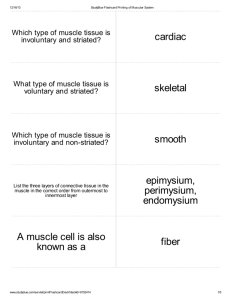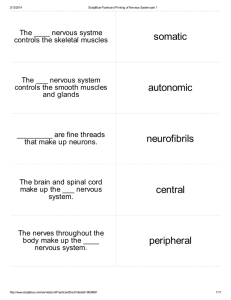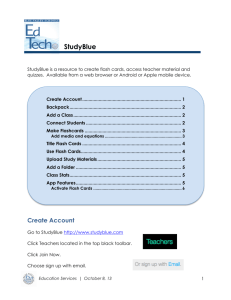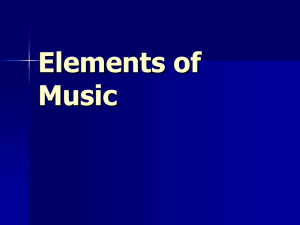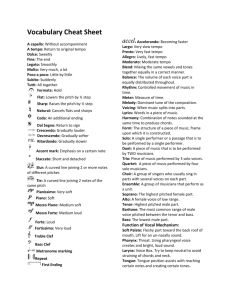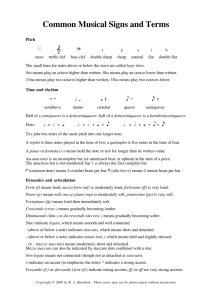Basic Music Terms for Final Exam
advertisement
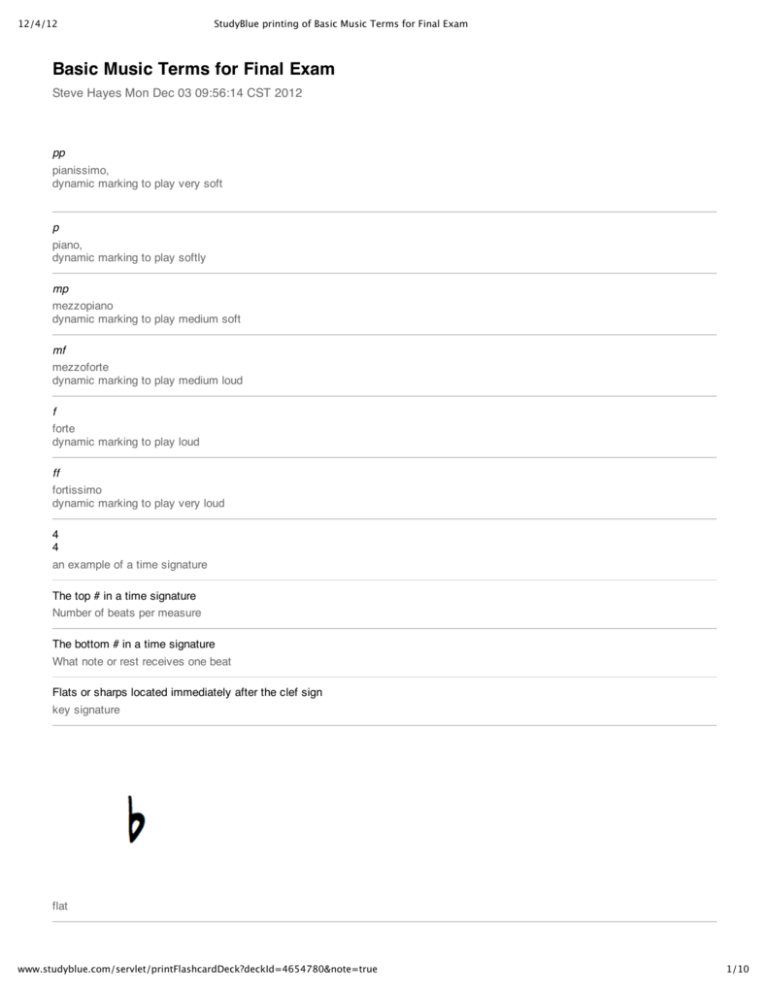
12/4/12 StudyBlue printing of Basic Music Terms for Final Exam Basic Music Terms for Final Exam Steve Hayes Mon Dec 03 09:56:14 CST 2012 pp pianissimo, dynamic marking to play very soft p piano, dynamic marking to play softly mp mezzopiano dynamic marking to play medium soft mf mezzoforte dynamic marking to play medium loud f forte dynamic marking to play loud ff fortissimo dynamic marking to play very loud 4 4 an example of a time signature The top # in a time signature Number of beats per measure The bottom # in a time signature What note or rest receives one beat Flats or sharps located immediately after the clef sign key signature flat www.studyblue.com/servlet/printFlashcardDeck?deckId=4654780&note=true 1/10 12/4/12 StudyBlue printing of Basic Music Terms for Final Exam sharp natural bar line measure, the distance between two bar lines www.studyblue.com/servlet/printFlashcardDeck?deckId=4654780&note=true 2/10 12/4/12 StudyBlue printing of Basic Music Terms for Final Exam repeat sign D.C.(Da Capo) Repeat back to the beginning of the song D.S. (Dal Sagno) Repeat back to the sign Whole Note 4 beats Whole Rest 4 beats Dotted Half Note www.studyblue.com/servlet/printFlashcardDeck?deckId=4654780&note=true 3/10 12/4/12 StudyBlue printing of Basic Music Terms for Final Exam 3 beats Half Note 2 beats Half Rest 2 beats Dotted Quarter Note 1.5 beats Dotted quarter rest 1.5 beats www.studyblue.com/servlet/printFlashcardDeck?deckId=4654780&note=true 4/10 12/4/12 StudyBlue printing of Basic Music Terms for Final Exam Quarter Note 1 beat Quarter Rest 1 beat Eighth Note 1/2 beat Eighth Rest 1/2 beat www.studyblue.com/servlet/printFlashcardDeck?deckId=4654780&note=true 5/10 12/4/12 StudyBlue printing of Basic Music Terms for Final Exam Sixteenth Note 1/4 beat Sixteenth Rest 1/4 beat When 6/8 is played at a fast tempo (i.e. "76 Trombones"), what type of note or rest receives one beat? Dotted Quarter Crescendo (cresc.) To gradually increase in volume Crescendo, to gradually increase in volume Decrescendo (decresc.) To gradually decrease in volume. www.studyblue.com/servlet/printFlashcardDeck?deckId=4654780&note=true 6/10 12/4/12 StudyBlue printing of Basic Music Terms for Final Exam Decrescendo, To gradually decrease in volume. Legato To play notes smooth and connected Accent, To play the note with greater emphasis Staccato To play note in a separated, detached style Slur, To connect two notes that are different in pitch. Tie, To connect two (or more) notes together that are the same in pitch. www.studyblue.com/servlet/printFlashcardDeck?deckId=4654780&note=true 7/10 12/4/12 StudyBlue printing of Basic Music Terms for Final Exam Final Bar Line, End of Song Fermata, Hold the note out longer than the usual duration. Treble Clef, also known as "G Clef" Bass Clef, Also known as "F Clef" www.studyblue.com/servlet/printFlashcardDeck?deckId=4654780&note=true 8/10 12/4/12 StudyBlue printing of Basic Music Terms for Final Exam Percussion Clef BEADGCF The order of flats FCGDAEB The order of sharps poco a poco Little by little Accelerando, (accel.) To gradually increase in tempo Ritardando (rit.) To gradually decrease in tempo // Grand Pause, Also known as caesura Presto A musical tempo that is very fast Allegro A musical tempo that is fast poco rall. To slightly decrease in tempo. ("little slow down") a tempo To return to the previous tempo (prior to what ever tempo changed occurred) Staccato, to play not in a separated, detached style www.studyblue.com/servlet/printFlashcardDeck?deckId=4654780&note=true 9/10 12/4/12 StudyBlue printing of Basic Music Terms for Final Exam adagio A moderately slow tempo Diminuendo (dim) Gradually growing softer Repeat previous measure www.studyblue.com/servlet/printFlashcardDeck?deckId=4654780&note=true 10/10
